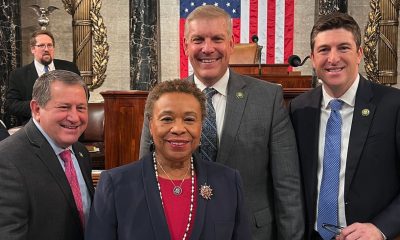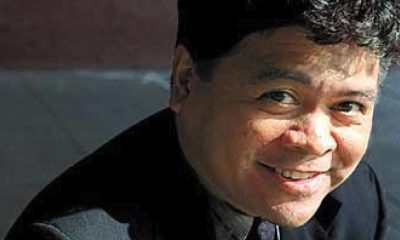Bay Area
OPINION – Will The 2020 Census Change the Course of History for the Black Community?

Every 10 years, the U.S. Census Bureau works to conduct an accurate count of the nation’s population, as provided for under the U.S. Constitution. This decennial count – which is currently underway – is one of our nation’s most inclusive civic activities, including every person living in the country, regardless of age, race, ethnicity, religion or citizenship.
An accurate count is essential to our democracy and our community’s growth because the data helps determine how much federal funding and political representation each state and community receives.
Census results are used to determine political seats and draw district lines for all levels of government and to allocate hundreds of billions of dollars in federal spending nationwide for critical community resources like parks, infrastructure, health care, and support programs in education, housing grants and nutrition.
African Americans have been systematically undercounted from the very first census, disadvantaging Black communities and neighborhoods, and silencing our voices. An inaccurate census count can negatively impact community programming for schools, housing, health care services, business investment and much more.
The first census count in 1790 deliberately listed only the names of the heads of free Black households, while all other free persons were listed by age.
By the 1860 census, at the start of the Civil War, the Black population increased to 4.4 million, about 14% of the overall population of the country. Yet, the explicit undercount of the Black population continued until the first post-Civil War census in 1870, following granting citizenship and equal civil and legal rights to African Americans and slaves under the Fourteenth Amendment.
Over the following century, explicit discrimination was outlawed – but systemic discrimination persisted.
Even today, the Census continues to disproportionately and systematically undercount the Black population. Black men have been undercounted in greater numbers than men of any other racial or ethnic group.
In 2010, Black children were undercounted at twice the rate as a young non-Black child, affecting the funding for programs designed to serve children and families, like Supplemental Nutrition Assistance Programs and the National School Lunch Program.
Even as the 2010 census overcounted the population as a whole, it undercounted the Black population by more than 800,000 people.
Certainly, there are social and economic problems that make the Black community hard-to-count, including increased rates of housing instability, industrialized incarceration, homelessness, and even lack of internet access.
And a deep distrust of government and concerns about privacy only make things worse.
This means many in the Black community are “missing” in their own communities, hiding in plain sight – even to this day.
These are unprecedented times. So, we must come together to ensure that Black communities are seen, heard and counted.
That starts by ensuring that people know what to do to participate: You can go to my2020census.gov right now to fill out the form. It’s a simple, confidential nine-question survey that asks for basic information like your name, address, sex, race, and age.
For those who prefer to fill out the form over the phone, you can dial 844-330-2020 to participate.
And don’t forget, your responses to the Census are protected by law and cannot be shared with, or used by, any other government agencies. Answers cannot be used for law enforcement purposes or to determine eligibility for government benefits or immigration enforcement.
Black Californians deserve a fair and accurate census count in 2020. Our democracy relies on accurate data to make sound decisions that reflect our country’s needs. An accurate representation of our communities in the census will allow Black Americans to have a greater influence over resources and representation and the ability to hold lawmakers accountable. The Black community has an opportunity to change the history of the census in 2020 and participate in record numbers – let’s seize this moment.
David Tucker is with the California Census Complete Count Office.
Activism
OP-ED: AB 1349 Puts Corporate Power Over Community
Since Ticketmaster and Live Nation merged in 2010, ticket prices have jumped more than 150 percent. Activities that once fit a family’s budget now take significant disposable income that most working families simply don’t have. The problem is compounded by a system that has tilted access toward the wealthy and white-collar workers. If you have a fancy credit card, you get “presale access,” and if you work in an office instead of a warehouse, you might be able to wait in an online queue to buy a ticket. Access now means privilege.

By Bishop Joseph Simmons, Senior Pastor, Greater St. Paul Baptist Church, Oakland
As a pastor, I believe in the power that a sense of community can have on improving people’s lives. Live events are one of the few places where people from different backgrounds and ages can share the same space and experience – where construction workers sit next to lawyers at a concert, and teenagers enjoy a basketball game with their grandparents. Yet, over the past decade, I’ve witnessed these experiences – the concerts, games, and cultural events where we gather – become increasingly unaffordable, and it is a shame.
These moments of connection matter as they form part of the fabric that holds communities together. But that fabric is fraying because of Ticketmaster/Live Nation’s unchecked control over access to live events. Unfortunately, AB 1349 would only further entrench their corporate power over our spaces.
Since Ticketmaster and Live Nation merged in 2010, ticket prices have jumped more than 150 percent. Activities that once fit a family’s budget now take significant disposable income that most working families simply don’t have. The problem is compounded by a system that has tilted access toward the wealthy and white-collar workers. If you have a fancy credit card, you get “presale access,” and if you work in an office instead of a warehouse, you might be able to wait in an online queue to buy a ticket. Access now means privilege.
Power over live events is concentrated in a single corporate entity, and this regime operates without transparency or accountability – much like a dictator. Ticketmaster controls 80 percent of first-sale tickets and nearly a third of resale tickets, but they still want more. More power, more control for Ticketmaster means higher prices and less access for consumers. It’s the agenda they are pushing nationally, with the help of former Trump political operatives, who are quietly trying to undo the antitrust lawsuit launched against Ticketmaster/Live Nation under President Biden’s DOJ.
That’s why I’m deeply concerned about AB 1349 in its current form. Rather than reining in Ticketmaster’s power, the bill risks strengthening it, aligning with Trump. AB 1349 gives Ticketmaster the ability to control a consumer’s ticket forever by granting Ticketmaster’s regime new powers in state law to prevent consumers from reselling or giving away their tickets. It also creates new pathways for Ticketmaster to discriminate and retaliate against consumers who choose to shop around for the best service and fees on resale platforms that aren’t yet controlled by Ticketmaster. These provisions are anti-consumer and anti-democratic.
California has an opportunity to stand with consumers, to demand transparency, and to restore genuine competition in this industry. But that requires legislation developed with input from the community and faith leaders, not proposals backed by the very company causing the harm.
Will our laws reflect fairness, inclusion, and accountability? Or will we let corporate interests tighten their grip on spaces that should belong to everyone? I, for one, support the former and encourage the California Legislature to reject AB 1349 outright or amend it to remove any provisions that expand Ticketmaster’s control. I also urge community members to contact their representatives and advocate for accessible, inclusive live events for all Californians. Let’s work together to ensure these gathering spaces remain open and welcoming to everyone, regardless of income or background.
Activism
Oakland Post: Week of December 31, 2025 – January 6, 2026
The printed Weekly Edition of the Oakland Post: Week of – December 31, 2025 – January 6, 2026

To enlarge your view of this issue, use the slider, magnifying glass icon or full page icon in the lower right corner of the browser window.
Activism
Big God Ministry Gives Away Toys in Marin City
Pastor Hall also gave a message of encouragement to the crowd, thanking Jesus for the “best year of their lives.” He asked each of the children what they wanted to be when they grow up.

By Godfrey Lee
Big God Ministries, pastored by David Hall, gave toys to the children in Marin City on Monday, Dec. 15, on the lawn near the corner of Drake Avenue and Donahue Street.
Pastor Hall also gave a message of encouragement to the crowd, thanking Jesus for the “best year of their lives.” He asked each of the children what they wanted to be when they grew up.
Around 75 parents and children were there to receive the presents, which consisted mainly of Gideon Bibles, Cat in the Hat pillows, Barbie dolls, Tonka trucks, and Lego building sets.
A half dozen volunteers from the Big God Ministry, including Donnie Roary, helped to set up the tables for the toy giveaway. The worship music was sung by Ruby Friedman, Keri Carpenter, and Jake Monaghan, who also played the accordion.
Big God Ministries meets on Sundays at 10 a.m. at the Mill Valley Community Center, 180 Camino Alto, Mill Valley, CA Their phone number is (415) 797-2567.
-

 Activism4 weeks ago
Activism4 weeks agoDesmond Gumbs — Visionary Founder, Mentor, and Builder of Opportunity
-

 Activism4 weeks ago
Activism4 weeks agoFamilies Across the U.S. Are Facing an ‘Affordability Crisis,’ Says United Way Bay Area
-

 Alameda County4 weeks ago
Alameda County4 weeks agoOakland Council Expands Citywide Security Cameras Despite Major Opposition
-

 Alameda County4 weeks ago
Alameda County4 weeks agoBling It On: Holiday Lights Brighten Dark Nights All Around the Bay
-

 Activism4 weeks ago
Activism4 weeks agoBlack Arts Movement Business District Named New Cultural District in California
-

 Activism4 weeks ago
Activism4 weeks agoLu Lu’s House is Not Just Toying Around with the Community
-

 Activism4 weeks ago
Activism4 weeks agoOakland Post: Week of December 17 – 23, 2025
-

 Black History3 weeks ago
Black History3 weeks agoAlfred Cralle: Inventor of the Ice Cream Scoop





















































